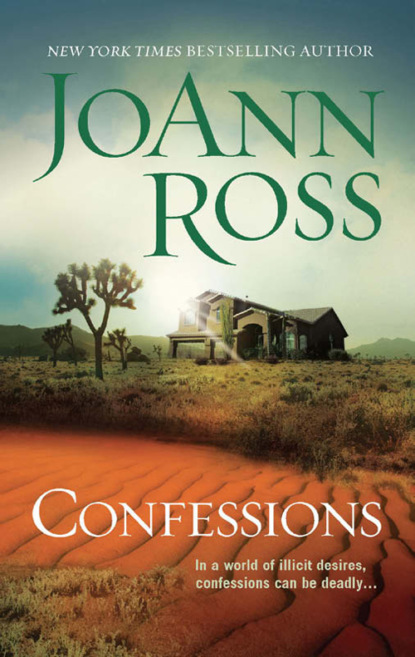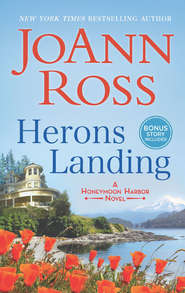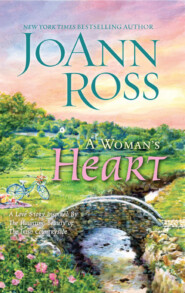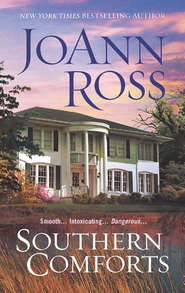По всем вопросам обращайтесь на: info@litportal.ru
(©) 2003-2025.
✖
Confessions
Автор
Год написания книги
2018
Настройки чтения
Размер шрифта
Высота строк
Поля
“I’ll make it up to you, Laurie.” Guilt and regret snaked through her. “I promise.”
Unable to sit still, Mariah began to pace and smoke. Waiting for morning.
* * *
Trace Callahan was dog tired. Throughout the night he’d driven the back roads, setting up barricades in the pouring rain, trying to keep idiot vacationers and drunk residents of Mogollon County from driving their four-wheelers into the raging Whiskey River.
When he’d first applied for the job of sheriff, he couldn’t help thinking of the old days when cowboys got drunk and smashed up Whiskey River’s saloons. These days, kids got drunk and smashed up their daddies’ pickups.
He hung his dripping poncho on the rack by the front door and tossed his hat onto a nearby table. Rotating his aching shoulder, which went stiff when it rained, he went into the kitchen, ignoring the trail of muddy footprints he left in his wake.
He opened the refrigerator and had just pulled out the beer he’d been thinking about for the last hour, when the phone rang. The caller I.D. screen announced the call was from his office.
“I told you I was going off duty, Cora Mae,” he barked into the mouthpiece. “This had better be important.”
“It is if you consider a possible one-eighty-seven in progress important, Sheriff,” Cora Mae Jackson shot back.
A wave of adrenaline rushed through his body. Fatigue was immediately forgotten. “A one-eighty-seven?”
A murder? In Whiskey River? Impossible. There hadn’t been a murder in the Arizona mountain town since 1957, when Jared Lawson got drunk at a family Thanksgiving dinner and shot his mother-in-law to death over a white meat–dark meat argument.
“A one-eighty-seven,” the night dispatcher repeated. “At Senator Fletcher’s ranch.”
Trace could feel his body relaxing again. He hunched his stiff shoulder, holding the receiver against his neck as he unscrewed the beer cap.
“You mean a possible burglary.” There’d been at least a half dozen false alarms at the ranch. Trace wished Fletcher would either get the damn system fixed, or tear it out.
“After thirty-five years I should know my codes, Sheriff,” Cora Mae sniffed. “I meant a murder. The senator just called in on 911. He’s been shot. He thinks his wife was shot, too.”
Trace’s pulse rate soared. “Is the gunman still in the house?”
“The senator said he heard them run out. He thinks there were two of them.”
Trace slammed the bottle down onto the counter. Foam ran over his hand. “Why didn’t you say so in the first place?”
“I believe I did, Sheriff.”
“Dispatch the county medical unit,” Trace instructed. “And get hold of J.D.”
“J.D. was here when the call came in. He’s on his way to the ranch now.”
“Radio him and let him know I’m on the way. Oh, and tell him not to touch anything.”
“Ten-four,” she said. Trace would have had to have been deaf to miss the smug satisfaction in the dispatcher’s voice.
As he marched back out into the stormy night, Trace remembered a time when he’d genuinely loved being a cop. When he’d been filled with an overwhelming need to help.
He’d especially enjoyed being a homicide detective—the murder police. The top of the rung, the cream of the crop. The goddamn best. He’d gotten off on the crime scenes, the countless cups of coffee, the chain smoking, the pursuit, the face-to-face confrontation with a killer. And that inimitable sound of handcuffs clicking around the wrists of the bad guys had never failed to give him an adolescent rush.
He woke up each morning juiced, ready to hit the streets and save the world. But that had been in what now seemed like another lifetime.
Unfortunately, justice had proven to be not only blindfolded, but deaf and dumb as well and Detective Sergeant Trace Callahan had learned the hard way that one man couldn’t save the world from itself.
Now all he wanted was a chance to build himself a quiet, uneventful life where he didn’t have to worry about some coked-up drug dealer pumping bullets into him. As he climbed into the black-and-white Suburban, Trace considered that he thought he’d found exactly that when he signed his contract six months ago.
Cursing whatever lowlifes had so rudely intruded on his peaceful existence, he gunned the engine and headed, emergency lights flashing, toward the Fletcher ranch.
Whiskey River was sleeping as Trace drove through the darkened streets. Even in the slanting rain, the town had a certain charm about it, a quaintness that had little in common with the dirty business of murder.
Whiskey River, Arizona, was home to 350 full-time residents and at least triple that many during the summer, when vacationers came streaming north to escape the desert heat. If it looked familiar to first-time visitors, it should. Whiskey River had served as a movie set on more than one occasion.
Gene Autry, John Wayne and Clint Eastwood had all ridden horseback down Main Street. So had Doc Holliday and Wyatt Earp, but the make-believe cowboys had bigger displays in the local historical museum.
Originally settled more than fifteen hundred years ago by prehistoric people classified by archaeologists as the Mogollon Culture, the area had subsequently been home to Apaches, soldiers, prospectors, loggers and ranchers. While Tombstone residents were making headlines by shooting at each other, Whiskey River became known for its taverns and brothels.
Once upon a time, settlers had run into town for protection from marauding Indians. These days citizens tried to liven things up again by holding rodeos at the fairgrounds.
Five miles outside of town, Trace turned onto a narrow graded road that snaked its way in a breath-stealing ascension up the rocky escarpment of the Mogollon Rim.
He arrived at the ranch right behind the ambulance.
His deputy’s black-and-white was parked in front of the house. The bubble gum lights atop the cruiser were sending out flashing blue strobes. The driver’s door was open. As he passed the patrol car, Trace cursed and yanked the keys from the ignition. A recent graduate of University of Arizona, with a bachelor’s degree in criminal justice, J.D. Brown was intelligent, enthusiastic and showed a willingness to learn. He was also green as new grass and prone to the same mistakes made by rookies in jurisdictions everywhere.
The deputy was waiting at the door. “The senator’s in the den, just to the right of the front door,” he told the medical team. “He’s been shot in the side.”
“Is he conscious?” the female paramedic asked.
“In and out.”
“What about the wife?”
The deputy frowned. “She’s upstairs. But take care of the senator. It’s too late for her.”
“You sure?” Trace asked.
“She was ten-seven when I got here,” J.D. insisted.
Ten-seven. The police code for Out of Service. Crude, but applicable, Trace decided. “I spent summers working in the emergency room at Louis R. Pyle Memorial,” the younger officer, the son of a nurse, reminded Trace. “I sure as hell know a lost cause when I see it.”
Trace accompanied the trio into the book-lined den where he found a man clad in a pair of paisley silk boxer shorts sprawled on his back on the floor by the doorway. He was in his midforties, with the kind of firm, lean body that came from working out. His deep tan and sun-streaked hair suggested afternoons spent on a Georgetown tennis court. A small amount of blood was draining from what appeared to be a single wound in his side. He’d obviously been lying on the couch when he was shot. Blood spatters stained the fawn-colored leather.
Beside the couch was a table. Atop the table was an empty glass, an open briefcase and a telephone. The phone was off the hook. The desk drawers had been rifled through; papers were strewn across the floor. A black carry-on suitcase was beside the couch, unopened.
“Senator?” The female medic wrapped a blood pressure cuff around the man’s upper arm. The other paramedic slammed an oxygen mask over his face. “It’s okay. You’re going to be okay. We’re here to help.”
“My wife,” Alan Fletcher gasped, his words muffled by the plastic mask. “Help...Laura.”
Trace squatted down, bringing himself eye to eye with the injured man. “Can you tell me what happened, Senator?”











